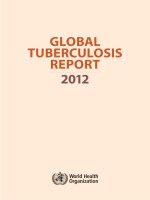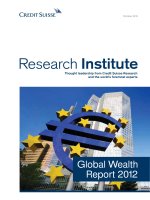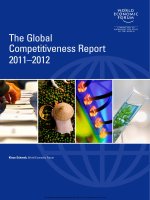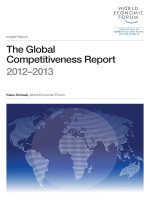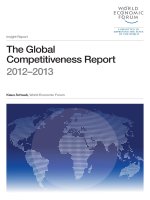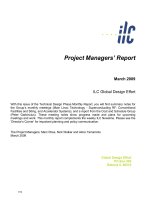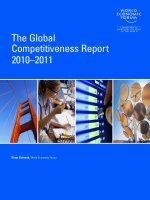Global corruption report sport
Bạn đang xem bản rút gọn của tài liệu. Xem và tải ngay bản đầy đủ của tài liệu tại đây (6.88 MB, 399 trang )
Global Corruption
Report:
Sport
Sport is a global phenomenon engaging billions of people and generating annual revenues
of more than US$145 billion. Problems in the governance of sports organisations, the fixing
of matches and the staging of major sporting events have spurred action on many fronts.
Attempts to stop corruption in sport, however, are still at an early stage.
The Global Corruption Report (GCR) on sport is the most comprehensive analysis of sports
corruption to date. It consists of more than 60 contributions from leading experts in the fields
of corruption and sport, from sports organisations, governments, multilateral institutions,
sponsors, athletes, supporters, academia and the wider anti-corruption movement.
This GCR provides essential analysis for understanding the corruption risks in sport,
focusing on sports governance, the business of sport, the planning of major events and
match-fixing. It highlights the significant work that has already been done and presents
new approaches to strengthening integrity in sport. In addition to measuring transparency
and accountability, the GCR gives priority to participation, from sponsors to athletes to
supporters – an essential to restoring trust in sport.
Transparency International (TI) is the global civil society organisation leading the fight
against corruption. Through more than 100 chapters worldwide and an international
secretariat in Berlin, TI raises awareness of the damaging effects of corruption and works with
partners in government, business and civil society to develop and implement effective
measures to tackle it.
“Transparency International have for years undertaken valuable, authoritative work
on governance issues of vital importance in sport, and the concerns they have
raised have been repeatedly vindicated. The research and insights in this book
provide another major contribution to the recognition that sports must be true to the
love people have for them.”
–David Conn, The Guardian
“At last a truly comprehensive, critical and impassioned look at the whole range of
governance and corruption issues that have engulfed global sport. For those that
want to know what has been going on, why, and how to do something about it, this
book will be their first point of call.”
–David Goldblatt, award-winning author of The Game of Our Lives:
The Meaning and Making of English Football
Global Corruption
Report:
Sport
TRAnSpARenCy
InTeRnATIonAl
First published 2016
by Routledge
2 Park Square, Milton Park, Abingdon, Oxon OX14 4RN
and by Routledge
711 Third Avenue, New York, NY 10017
Routledge is an imprint of the Taylor & Francis Group, an informa business
© 2016 Transparency International
Editor: Gareth Sweeney, Associate Editor: Kelly McCarthy
The right of Transparency International to be identified as the author of the
editorial material, and of the authors for their individual chapters, has been
asserted in accordance with sections 77 and 78 of the Copyright, Designs
and Patents Act 1988.
All rights reserved. No part of this book may be reprinted or reproduced or
utilised in any form or by any electronic, mechanical, or other means, now
known or hereafter invented, including photocopying and recording, or in any
information storage or retrieval system, without permission in writing from the
publishers.
Trademark notice: Product or corporate names may be trademarks or
registered trademarks, and are used only for identification and explanation
without intent to infringe.
British Library Cataloguing-in-Publication Data
A catalogue record for this book is available from the British Library
Library of Congress Cataloging-in-Publication Data
A catalog record for this book has been requested
ISBN: 978-1-138-90589-4 (hbk)
ISBN: 978-1-138-90592-4 (pbk)
ISBN: 978-1-315-69570-9 (ebk)
Typeset in Helvetica
by Keystroke, Station Road, Codsall, Wolverhampton
Contents
List of illustrations
xi
Preface
Cobus de Swardt, Managing Director, Transparency International
xiii
Foreword
Raí Souza Vieira de Oliveira, founder of the Gol de Letra Foundation and
captain of the Brazilian 1994 World Cup winning team
xv
Acknowledgements
xvii
Executive summary
Gareth Sweeney, Editor, Global Corruption Report, Transparency International
xix
part 1 Governance of sport: the global view
1
1.1
Sport as a force for good
Bob Munro, Mathare Youth Sports Association and Mathare United FC
3
1.2
Fair play: ideals and realities
Richard H. McLaren, McLaren Global Sport Solutions
1.3
Autonomy and governance: necessary bedfellows in the fight
against corruption in sport
Jean-Loup Chappelet, IDHEAP Swiss Graduate School
of Public Administration
1.4
Obstacles to accountability in international sports governance
Roger Pielke Jr, University of Colorado
1.5
Political interference, power struggles, corruption and greed:
the undermining of football governance in Asia
James M. Dorsey, S. Rajaratnam School of International Studies
12
16
29
39
1.6
Corruption in African sport: a summary
Chris Tsuma, Africa Centre for Open Governance (AfriCOG)
44
1.7
Impunity and corruption in South American football governance
Juca Kfouri, Folha de São Paulo
52
vi
CONTENTS
1.8
Indicators and benchmarking tools for sports governance
Arnout Geeraert, Catholic University of Leuven
56
1.9
Examples of evolving good governance practices in sport
Michael Pedersen, M INC
62
1.10 For the good of the game? Governance on the outskirts
of international football
Steve Menary, World Soccer
65
1.11 Image-laundering by countries through sports
Naomi Westland, Amnesty International UK
73
1.12 Opening the door to corruption in Hungary’s sport financing
Miklós Ligeti and Gyula Mucsi, Transparency International Hungary
79
1.13 Challenges and approaches to ensuring good governance in
grassroots sport
Mogens Kirkeby, International Sport and Culture Association (ISCA)
1.14 The Code of Ethics for sport in the Municipality of Milan:
a grassroots approach against organised crime and corruption in sports
Paolo Bertaccini Bonoli, Transparency International Italy,
and Caterina Gozzoli, Catholic University of Milan
part 2 Money, markets and private interests in football
88
94
99
2.1
Offside: FIFA, marketing companies and undue influence in football
Jamil Chade, O Estadão
101
2.2
Measuring the United Kingdom’s ‘offshore game’
George Turner, Tax Justice Network
105
2.3
Unfit, improper ownership in UK football clubs
Arjun Medhi, UK Chartered Institute for Public Finance and Accountancy
109
2.4
Agents and beyond: corruption risks in the football transfer market
and the need for reform
Raffaele Poli, Football Observatory of the Centre International
d’Étude du Sport, University of Neuchâtel
114
2.5
Third-party ownership of football players: human beings or traded assets?
Jonas Baer-Hoffmann, FIFPro
118
2.6
Origins, practice and regulation of third-party ownership in South America
Alexandra Gómez Bruinewoud, FIFPro, and Gonzalo Bossart,
Alessandri, Bossart, Pacheco and Cia
125
CONTENTS
vii
part 3 events in the spotlight
131
3.1
The multiple roles of mega-events: mega-promises, mini-outcomes?
Martin Müller, University of Zurich
133
3.2
Who bids for events and why?
Scarlett Cornelissen, Stellenbosch University
139
3.3
The problem with sporting mega-event impact assessment
Eleni Theodoraki, Edinburgh Napier University
143
3.4
Corruption and the bidding process for the Olympics and World Cup
Andrew Zimbalist, Smith College
152
3.5
Compromise or compromised? The bidding process for the award
of the Olympic Games and the FIFA World Cup
Stefan Szymanski, Michigan Center for Sport Management
157
The planning and hosting of sports mega-events: sources,
forms and the prevention of corruption
John Horne, University of Central Lancashire
163
Preventing corruption in the planning of major sporting events:
open issues
Wolfgang Maennig, Hamburg University
169
Malpractice in the 2010 Delhi Commonwealth Games and
the renovation of Shivaji Stadium
Ashutosh Kumar Mishra, Transparency International India
174
Preventing corruption ahead of major sports events: learning from
the 2012 London Games
Kevin Carpenter, Captivate Legal and Sport Solutions
178
3.6
3.7
3.8
3.9
3.10 The 2014 Sochi Winter Olympics: who stands to gain?
Oleg Golubchikov, Cardiff University
183
3.11 The need for transparency and monitoring ahead
of the 2018 World Cup in Russia
Anna Koval and Andrew Jvirblis, Transparency International Russia
192
3.12 Sporting mega-events, corruption and rights: the case
of the 2022 Qatar World Cup
Sharan Burrow, International Trade Union Confederation
198
3.13 The Brazilian experience as ‘role model’
Christopher Gaffney, University of Zurich
204
viii
CONTENTS
3.14 Rio 2016 and the birth of Brazilian transparency
Andy Spalding, Pat Barr, Albert Flores, Kat Gavin, Shaun Freiman,
Tyler Klink, Carter Nichols, Ann Reid and Rina Van Orden,
University of Richmond
211
3.15 Sports mega-event legacies: from the beneficial to the destructive
Helen Lenskyj, University of Toronto
218
3.16 Urban speculation by Spanish football clubs
Nefer Ruiz Crespo, Transparency International Spain
223
part 4 Match-fixing
229
4.1
Why sport is losing the war to match-fixers
Declan Hill, investigative journalist
231
4.2
The role of the betting industry
Ben Van Rompuy, TMC Asser Institute
236
4.3
Cricket in Bangladesh: challenges of governance and match-fixing
Iftekhar Zaman, Rumana Sharmin and Mohammad Nure Alam,
Transparency International Bangladesh
242
4.4
The gap between sports institutions and the public will: responses
to match-fixing in Lithuania
Rugile Trumpyte, Transparency International Lithuania
250
4.5
Australia’s ‘National Policy on Match-Fixing in Sport’
Jane Ellis, Transparency International Australia
254
4.6
Match-fixing: the role of prevention
Ulrike Spitz, Transparency International Germany
257
4.7
New media approaches to tackling match-fixing in Finnish football
Annukka Timonen, Transparency International Finland
262
4.8
Prevention and education in match-fixing: the European experience
Deborah Unger, Transparency International
264
4.9
The Austrian approach: how to combat match-fixing and promote
integrity in sport
Severin Moritzer, Play Fair Code
269
part 5 The US model: collegiate sports and corruption
273
5.1
275
The roots of corruption in US collegiate sport
Donna Lopiano, Sports Management Resources
CONTENTS
5.2
Academic fraud and commercialised collegiate athletics: lessons
from the North Carolina case
Jay M. Smith, University of North Carolina, Chapel Hill
ix
286
5.3
The evolution of professional college sport in the United States
Allen Sack, University of New Haven
293
5.4
Inequality, discrimination and sexual violence in US collegiate sports
Erin Buzuvis, Western New England University, and Kristine Newhall,
University of Massachusetts, Amherst
300
part 6 The role of participants: within and beyond the sports family
6.1
6.2
307
The International Olympic Committee’s actions to protect the
integrity of sport
Pâquerette Girard Zappelli, International Olympic Committee
309
Combating the risk of corruption in sport: an intergovernmental
perspective
Stanislas Frossard, Council of Europe, Enlarged Partial Agreement on Sport
313
6.3
UNESCO: building on global consensus to fight corruption in sport
Nada Al-Nashif, UNESCO
6.4
The role of Switzerland as host: moves to hold sports organisations
more accountable, and wider implications
Lucien W. Valloni and Eric P. Neuenschwander, Froriep
6.5
Promoting integrity in sport: a sponsor’s perspective
Jaimie Fuller, SKINS
6.6
A player’s perspective on the need for reform to enhance
transparency and integrity in sports
Louis Saha, Axis Stars
318
321
327
332
6.7
Organised athletes: a critical voice in sports governance
Brendan Schwab, UNI World Athletes
335
6.8
The role of supporters in effective governance
Ben Shave and Antonia Hagemann, Supporters Direct
339
6.9
Learning from others: the Kick It Out campaign
Richard Bates, Kick It Out
345
6.10 Big business blurs sports journalism’s critical eye
Peter English, University of the Sunshine Coast
347
x
CONTENTS
6.11 New ball game: covering sports, with teams as competitors
John Affleck, John Curley Center for Sports Journalism
352
6.12 What the anti-corruption movement can bring to sport: the experience
of Transparency International Germany
Sylvia Schenk, Transparency International Germany
359
Index
363
Illustrations
Figures
1.1
1.2
1.3
1.4
2.1
Key decisions in the evolution of ‘sports autonomy’
The need for governance
Subsidised football clubs in Hungary, 2011–2015
The church model of sport
Percentage of individual agents or agencies (entities) with clients in
the ‘Big Five’ leagues according to the percentage of players represented
3.1 Sports-related cost overruns, 1998–2012 Olympics
3.2 Domestic inputs to major event bids
3.3 Event stakeholder power–risk irony
3.4 Concepts and levels of focus
3.5 Sporting mega-event impact sphere
3.6 South Africa 2010
3.7 Costs of the Olympic Games per capita and as a percentage
of GDP, 2002–2014
3.8 The geography and funding of mega-events in Russia
3.9 Estádio Nacional de Brasília Mané Garrincha: Brasilia’s white elephant
3.10 Land value before and after construction of the New Condomina
stadium, Murcia
4.1 Match-fixing: football versus basketball
4.2 All bets are off
5.1 Highest paid public employee = collegiate sports head coach
5.2 ‘Potemkin’ courses for athletes
6.1 Support versus influence
21
23
82
89
115
135
141
145
148
149
155
185
194
205
225
251
258
280
287
341
Tables
1.1
3.1
3.2
3.3
Vote weighting in the Badminton World Federation
Scoring matrix for event classes according to size
Size classification of selected events
Public funds budgeted for the 2018 World Cup preparations
63–64
133
134
193
Boxes
1.1
1.2
1.3
1.4
1.5
1.6
The Sports Governance Observer
FIFA and the non-interference rule
France, Qatar and the purchase of Paris Saint-Germain
The ‘Good Governance in Grassroots Sport’ project
Examples of risks to grassroots good governance
Elements of the Code of Ethics for grassroots sport in the city of Milan
59
69
76
90
91
95
xii
ILLUSTRATIONS
3.1
3.2
3.3
4.1
6.1
6.2
Mega-event impact assessment: Athens Olympics 2004
Mega-event impact assessment: London Olympics 2012
Projeto Jogos Limpos: the ‘Clean Games’ project in Brazil
Gambling risks within professional football
Match-fixing and the law in Switzerland
The changing face of club ownership
144
146
214
260
322
339
Preface
Cobus de Swardt, Managing Director,
Transparency International
Sport gives people hope. It provides joy to billions of people across the world, from the
favelas of Rio de Janeiro to the boroughs of London. As fans we have a love affair with our
favourite game. When our teams win we are ecstatic; when they lose we are devastated.
When results – of games, of contests to host events or of elections to run sports bodies – are
determined not by fair competition but by corruption, however, we feel betrayed. Cleaning up
sport is therefore essential, not only for the good of the game but for the good of society as
a whole.
For more than 20 years Transparency International (TI) has led the fight against corruption,
through more than 100 independent national chapters around the world, which take action to
stop corruption and promote transparency, accountability and integrity at all levels and across
all sectors of society.
The Global Corruption Report (GCR) is a strong foundation to support this fight. This 11th
edition, for the first time complemented online through our new Corruption in Sport Initiative,
provides an authoritative look at the state of corruption in a given sector through contributions
from over 50 leading experts in the field. These are complemented by case studies from TI
national chapters that show how TI is tackling the problem at the national and local levels. The
aim is to provide clear recommendations for change.
Sport touches the lives of billions. No one wants to think that his or her favourite pastime
is tainted. This became unavoidable for football fans in May 2015, however, with the indictment
by the United States of nine current and former FIFA officials on charges of racketeering and
money-laundering, confirming the worst suspicions of many. These crises at the heart of
sport illustrate well-known issues: a culture of impunity at the top of sporting organisations
that gives free rein to bribery and obscures financial black holes. Implementing necessary and
long-lasting reforms will prove far more difficult.
Needless to say, corruption in sport is not limited to football, and the importance of fighting
corruption is not limited to the effect on sport only. Sport is a symbol of fair play around the
world, and often provides a release from daily hardships for many, whether it is taking part in
or supporting a local team. If trust in sport is lost and people can no longer believe what they
are seeing on the field of play or hearing from those in charge, then public trust in any institution
may be irreparably undermined.
The issues addressed in the GCR can draw from the experience of TI and the anticorruption movement in other sectors. There are so many people who want to have a say in
sports – from the citizens in cities where big events are held to the parents of kids in grassroots clubs – and it is imperative that this wider sports family is heard. It is for this reason that
the current GCR focuses on participation as key to strengthening sport integrity.
We at Transparency International recognise that the fight against corruption in sport is not
new, and we are indebted to those individuals who, long before it was on our agenda, dug
deep at great personal risk to uncover the truth. Our goal is for the new GCR and the
xiv
PREFACE
Corruption in Sport Initiative to help to bring these voices together in one place. We also hope
to continue to provide an open space for new analysis and recommendations.
Everyone has a stake is keeping sports clean. Our chapters around the world will continue
to demand clean sports, but the voices of athletes, supporters, governments, sponsors,
journalists and, primarily, those within sports organisations need to combine to send a strong
message that integrity matters, for the good of the game and the good of the global fight
against corruption.
Now is the time.
Foreword
Raí Souza Vieira de Olivera, founder of
the Gol de Letra Foundation and captain
of the Brazilian 1994 World Cup winning team
What would become of humanity if the act of simply playing the game to enjoy yourself did not
exist? If playfulness did not exist? If competition did not exist? We would probably be identical,
dispassionate beings, losing much of the grace, humour and beauty that we have been given.
Sport is nothing more than natural fun and healthy play packaged in rules to create just
conditions among participants and contain the excesses that any impassioned activity
or competition awakens. From this is born the expression ‘the spirit of sport’. Health, fun,
justice, passion – these are basic values for any child, any human being, any society: values
transformed into rules, rights and laws.
For the development of sport, it was necessary to create organisations – associations,
federations and confederations – to impose and administer these collective values. Hierarchies
of power began to develop without guarantees of a democratic, participatory and transparent
system. Sport is a large source of inspiration, but it is run with an absurd autonomy, without
effective checks.
Sporting administrative bodies have evolved to take ownership of an enormous and
notorious public interest, involving soul and passion. They even win freely the right to
represent countries and nations. These organisations operate almost as independent states,
however, without effective counterbalances and with vast possibilities to manoeuvre to remain
in power. They claim legitimacy for their promotion, but demand complete autonomy in selfmanagement, and even in self-punishment.
Corruption is for sport as doping is for competition, and for the health of the athlete. This
framework has provided many reasons, motivations, contradictions and counter-intuitions,
which build and today form one of the most enabling environments for acts of corruption to
take place and proliferate, allowing the corrupt and greedy to gain an interest in sport, and
impunity to take hold.
To rethink this, let us return to the basics: health, fun, justice and passion!
If we really want sport to be the basis for a better society, to be one of the pillars for human
and social development, we need to rethink the rules of sports governance and their criteria
of representation and accountability – and build something new, transparent and committed.
For this we need (in the same way that we created and systematically perfected sports
themselves) to evolve in terms of governance, building a system in which fair play always
prevails. We need to create a clean and healthy structure and new rules that guarantee
complete transparency and democratic participation.
Transparency International’s work on sport integrity – including the report before you –
provides a good framework for reform. The responsibility now lies with the participants of
sport, from the grass-roots to elite professionals, fans, sponsors, governments and, most
of all, sport organisations themselves, to demand the changes that are clearly needed, for the
good of sport and the good of humanity.
This page intentionally left blank
Acknowledgements
This Global Corruption Report on sport is a partnership and collaboration between
Transparency International (TI) and its authors, whose expertise has provided us with the
highest quality of content. We are very honoured to have worked with everyone involved and
hope that these relationships may continue long beyond this report.
We are especially grateful for the guidance of a group of distinguished experts who kindly
served on our Expert Advisory Panel and who were actively engaged throughout: Jens
Andersen, Wolfgang Baumann, Pâquerette Girard Zappelli, Tony Higgins, Jacques Marnewicke,
Richard Pound and Ben Shave.
We are also, as always, hugely indebted to the expert peer reviewers who devoted their
energies to improve the content: Paul Anderson, Mark Baber, Robert Barrington, Amita
Baviskar, Trish Bradbury, Gonzalo Bravo, Benjamin Bendrich, Scarlett Cornelissen, Pete
Dawson, Juan de Dios Crespo, Peter Donnelly, Jocelyn East, Iain Edmondson, Esther
Enkin, Neil Fergus, Leonardo Fernandes, Gyongyi Szabó Foldesi, John Foster, John Fourie,
Jason Genovese, David Greenspan, Oleg Golubchikov, Sean Hamil, Barry Houlihan, Dionne
Koller, Helen Lenskyj, Mike McNamee, Felix Majani, Jean-Paul Marthoz, Maira Martini,
Luiz Martins de Melo, Laura Misener, Matthew Mitten, Severin Moritzer, Martin Müller,
Bridget Niland, Walter Palmer, Katarina Pijetlovic, Denis Primakov, Stephen Pritchard,
Dino Ruta, Chris Smith, Harry Arne Solberg, Ulrike Spitz, Joe Stead, John Sugden, Eleni
Theodoraki, Ilija Trojanovic, George Turner, Pedro Velasquez, Geoff Walters, John Wilson and
Serhat Yilmaz.
As the work of TI continues to expand, we are indebted to our national chapters, whose
country case studies illustrate the approaches of the anti-corruption movement in tackling
corruption in sport. In particular, we would like to extend our thanks to Sylvia Schenk and
Ulrike Spitz for their valuable proposals during the initial scoping of our work. We are also
thankful to colleagues at the Transparency International Secretariat who lent their perspectives
and expertise. We are indebted to Deborah Unger, who is a real champion of our Secretariat
work in sport and a pleasure to work alongside. We would also like to thank Marie Terracol for
essential coordination work, Matthew Jenkins for initial mapping research, Eric Fichtl for
online design and creation of the TI Corruption in Sport Initiative, Nicky Rehbock for online
support, Thomas Coombes and Chris Sanders for communication, Kerstin Deinert and
Michael Sidwell for print design, Rachel Beddow for libel coordination, and Bruno Brandao
and Solange Falcetta for helping to arrange a number of outstanding contributors. As ever,
the Global Corruption Report has been guided by Robin Hodess, and now also with the
generous oversight of Casey Kelso. Finally, and especially, the team would like to thank our
former associate editors Samira Lindner, for her enthusiasm, sharp intellect and unwavering
commitment to the fight against corruption, and Kelly McCarthy, for her Herculean resolve
and keen editorial eye in seeing the Report past the final post.
Further afield, copy-editor Mike Richardson once again excelled and kept us in check, and
we are forever indebted. We were also delighted to work once more with Agur Paesüld,
whose graphics continue to give life to dry text. And, to those for whom the details are never
lost, we would like to thank our industrious fact-checkers: Oisín Bourke, Krista Brown,
xviii
ACKNOWLEDGEMENTS
Adam DeJulio, Natacha Draghi, Tyler Klink, Michelle McAlarnen, Holly Nazar, Sylvia Plaza and
Philippa Williams.
We are very happy to continue our collaboration with Routledge, and in particular we
extend our thanks to Helen Bell and Edward Gibbons for their continued support.
Finally, the Global Corruption Report team would like to acknowledge Liverpool FC,
Kilkenny City AFC (defunct), Ipswich Town FC and the Republic of Ireland national football
team for inspiring a love of sport and the desire to fight for its integrity.
Executive summary
Gareth Sweeney, Transparency International1
Sport is a global phenomenon engaging billions of people and generating annual revenues of
more than US$145 billion.2 While corruption in sport is not new,3 the recent pervasiveness
of poor governance and corruption scandals threatens to undermine all the joy that sport
brings and the good that it can do. For Transparency International (TI), the pace of building
integrity in sport has been too slow, and now it must be rapidly accelerated.
The indictments on 27 May 2015 of nine current and former Fédération Internationale
de Football Association (FIFA) officials on charges of racketeering and money-laundering4
changed the landscape overnight. Suddenly a system of ‘rampant, systemic and deeprooted corruption’ was brought starkly into global focus. The re-election two days later of the
FIFA president who had presided over this culture of impunity, and who was therefore either
complicit or oblivious (and, either way, had failed in his duties), exposed to the watching world
just how much football exists in a parallel universe of unaccountability. It is easy to understand
why public trust in FIFA is at an all-time low, and is set to go even lower if promises for reform
turn out to be business-as-usual.5
The context
Yet corruption in sport is not limited to football. Cricket, cycling, badminton, ice hockey,
handball, athletics and other sports, including US collegiate sports, suffer similar credibility
gaps. The reasons related to each are broadly similar.
Sport is a public interest, played and viewed by billions, whose tax dollars often fund
the hosting of major sporting events. Sport is also organised on the historic principle of
autonomy,6 however, and sports organisations – whether international organisations, regional
confederations or national associations – are subsequently afforded ‘non-profit’ or ‘nongovernmental organisation’ status in most jurisdictions. This allows them to operate without
any effective external oversight (or interference, depending on perspective). The statutes of
most sports associations therefore require that reforms are initiated and approved by the
same individuals who will be most directly affected by them. It stands to reason, then, that
the murkiest sports will be the most resistant to self-incrimination and change.
Even the corporate structures of sport are largely archaic. The administration of sport is
often overseen by ex-athletes with little prior experience in management, operating through
very linear hierarchical organisational models. While these models may have worked in the
past, many international sports organisations (ISOs), regional confederations and national
sports organisations (NSOs) have simply not kept pace with the huge commercial growth of
the sector, and have even chosen not to adapt in order to protect certain self-interests,
including high salaries, bonuses and virtually limitless tenures.
Finally, this insular environment is facilitated by the countries that host these organisations,
such as Switzerland and the United Arab Emirates, which traditionally afford favourable legal
status and generous tax breaks in order to attract and keep ISOs resident.7 Changes to
xx
EXECUTIVE SUMMARY
tighten legal accountability are under way,8 but these are usually tempered with caution since
ISOs may simply relocate if the screws are tightened.
The solutions
When Sepp Blatter vowed to step down as FIFA president on 2 June, he declared: ‘While
I have a mandate from the membership of FIFA, I do not feel that I have a mandate from the
entire world of football – the fans, the players, the clubs, the people who live, breathe and love
football . . .’ This short statement struck at the heart of the problem. Sports organisations,
from ISOs to local community clubs, have a responsibility for their sport, and should be
accountable to all those affected by their sport, from displaced communities to migrant
construction workers, from grass-roots fans to World Cup winners.
The current outcry against corruption at FIFA shows that, once roused, the wider sporting
community can become as interested in what goes on off the field of play as on it. Tackling
the roots of corruption must come primarily from within the sports community, though,
starting with an acknowledgement of the problem. There must be a sincere and verifiable
commitment to realise sport’s principles on inclusiveness and fair play, ‘to comply with the
highest standards in terms of transparency, democracy and accountability’.9
At the same time, internal reform must be open to external perspectives, including inputs
from athletes and supporters, governments, sponsors and civil society. The ‘sports family’
needs to welcome those with know-how in anti-corruption activities, good governance,
human rights, labour rights and development outside the world of sport as allies in the greater
interest of sport. The Global Corruption Report: Sport therefore places particular focus on
participation as a fundamental element of good governance in sport, and dedicates a full
chapter to the voices of key participants and their respective roles.
The Global Corruption Report: Sport provides a comprehensive overview of the root
causes of corruption across sport, presenting key participants’ perspectives side by side, as
well as the work of TI national chapters on the ground. It focuses on current challenges in
sports governance as the gateway through which all other forms of corruption in sport take
hold, including, for example, the regulation of club ownership and the transfer markets (here
the Report focuses on football). The Report gives special attention to the bidding, awarding
and planning of major sporting events as a particularly vulnerable area for widespread
corruption, as evidenced from the 1998 International Olympic Committee (IOC) Salt Lake
City scandal10 to ongoing investigations. It then looks at global developments around
the criminalisation and prevention of match-fixing, and what needs to be done. Space is
also provided for a chapter on the unique corruption risks inherent in the structure of US
collegiate sports, and its compromising influence on academic integrity. There are contradictory
opinions within the Report, and much still to tackle, but the wealth of information illustrates
how vibrant the field of sport and corruption has become in the past decade.
Drawing from this expert analysis of structural issues presented in the Global Corruption
Report: Sport, Transparency International identifies the following key recommendations to
restore public trust in sport.
Governance
Some reform recommendations in sport can be put in place very quickly, while others will
require a more incremental consultative approach. A step-by-step reform process, suitable to
the size and capacity of respective sports organisations, should incorporate many of the
good governance principles that guide other sectors.
EXECUTIVE SUMMARY
xxi
• Heads of ISOs should, as a rule, be elected by an open vote of members. National
members/associations of ISOs should be accountable for their positions to their national
constituencies.
• Executive decision-makers should be elected rather than appointed.
• There should be a clear separation between the administrative and commercial operations
of all ISOs/NSOs.
• Decision-making bodies should contain at least one independent executive member.
• The gender balance of decision-making bodies should at least reflect the gender balance
of participation in the respective sport as a whole.
• All ISO heads and decision-making body members should be bound by fixed terms, with
mandatory gaps in service before being eligible for re-election.
• Integrity checks should be required for all senior ISO committee and secretariat staff, to
be organised centrally and with independent external oversight. Due diligence criteria
should include potential commercial conflicts of interest, as well as any ongoing
investigations related to improper conduct. Integrity checks should be periodically reviewed.
• ISOs should put in place internal governance committees, presided over by an
independent non-executive or lead director on governance issues, to provide ongoing
external oversight of sport organisational decisions. Any review committees should have
the mandate to review past as well as present activities.
• Sports organisations should establish independent ethics commissions/ethics advisers,
with effective oversight and disciplinary authority related to codes of conduct and ethics
guidelines.
• Specialised units should be created within ISOs to regularly monitor member
associations and provide support in terms of governance and accountability.
• Structural reforms put in place in ISOs (elections, terms limits, integrity checks, codes of
conduct, ethics and compliance structures and authority, financial transparency) should
also be required to be applied uniformly to the structures of regional sports organisations
as applicable as a prerequisite to membership of ISOs.
• The IOC, in consultation with all relevant stakeholders, should give serious consideration
to the creation of an independent global anti-corruption agency for sport.
Transparency
• Sports organisations should establish cultures of transparency so that good work is not
just done but is seen to be done. Access to information policies should be integrated
and promoted.
• The publication of ISO finances – expenditures, revenues and disbursements – should be
disaggregated and go far beyond minimum legal requirements in host countries so as to
meet public expectations.
• Sports organisations should adhere to strict disclosure requirements, including financial
reporting, and adequately communicate their activities to their internal stakeholders and
the general public through accessible open data platforms.
• International and national sports organisations should publish the pay scales, as well as
the salaries and costs, of senior executives/members of the executive committee,
remuneration for board members, etc.
• The disbursement of funding to national member associations should be contingent on
the receipt of annual financial accounts and activity reports, to be made available to the
public via their national websites, and searchable on the websites of ISOs.
xxii
EXECUTIVE SUMMARY
• ISOs should adopt the use of governance benchmarking tools such as the BIBGIS or the
Sports Governance Observer to measure progress over time,11 and should periodically
publish the results and lessons learnt, to be included as a section in their annual reports.
participation
The primary responsibility for reform lies with sports organisations, from ISOs to the
grassroots bodies. This needs to be matched by sustained engagement with intergovernmental organisations, governments, athletes, sponsors, supporters and civil society.
• Any reform process to address systemic governance issues in sport should formally
provide for inputs by relevant stakeholders, including athletes, supporters, governments,
sponsors and human rights, labour and anti-corruption organisations. ISOs should
commit themselves to honouring the recommendations of any reform process or
providing formal responses for recommendations that are rejected.
• NSOs should support increased transparency and accountability, whether in speaking
out for institutional reform or publicly supporting reformist platforms around elections.
• Sponsors should demand that whoever they sponsor should live up to the same anticorruption and human rights standards that they are expected to adhere to in their own
operations and in their own supply chains. As individual sponsors may fear a ‘first-mover
disadvantage’, major sponsors should align to apply collective pressure for change.
Sponsors should therefore consider the creation of a Sports Integrity Group that sets out
their shared commitment to integrity in sport and allows major sponsors to advance a
common position for integrity in sport.
• Sponsors should conduct due diligence on any organisation they sponsor – just as they
do for their other business partners. They should also review their relationships with
intermediaries and sports marketing companies to ensure that the companies meet their
standards of integrity.
• Sponsors should ensure that their employees who work with ISOs, sports marketing
companies and other intermediaries are properly trained on their code and integrity
standards.
• Professional sport is nothing without supporters. Supporters’ groups can play an even
larger role than they do now, by mobilising a collective voice for key structural reforms in
ISOs and NSOs and demanding a seat at the table.
• National and local governments should ensure adequate legislation to address matchfixing and organised crime in grassroots sports. In the case of US collegiate sports in
particular, such legislation should protect the well-being of student athletes ahead of
commercial interests. Governments should also provide whistleblower protection for those
reporting malfeasance in sport, and effectively enforce access-to-information laws so as to
facilitate and ensure the effective monitoring of the planning and hosting of sports events.
• Intergovernmental organisations should continue to facilitate the coordination and
sharing of lessons learnt among national governments, and should develop indicators,
benchmarks and self-assessment tools to help national governments identify policy
gaps, needs, solutions and progress in promoting integrity in sport.
Major events
There are multiple entry points for corruption related to major sporting events. These include
the selection process for bids and the related canvassing, the courting of international
EXECUTIVE SUMMARY xxiii
delegates and the use of high-priced consultants for global bidding. There are also corruption
risks during the awarding process and related bribery risks. Finally, the planning and hosting
of events and the attendant large-scale procurement and construction risks put local
organising committees under intense pressure to provide the required infrastructure and
logistics on time. ISOs, as event owners, must ensure that the process is one of integrity, from
the pre-bidding phase to the closing ceremony and far beyond.
• ISOs should require a national consultation process at the pre-bidding stage. A summary
of national consultation outcomes should be publicly available, and must then be
presented as part of the bid criteria.
• ISOs should establish clear, obligatory anti-corruption, labour rights, human rights and
environmental and social sustainability criteria as objective admissibility safeguards for
the first round of bidding. They should then be assessed by internal and external joint
committees at this first round.
a
• Official bid documents must be publicly available and bidders must include
commitment to publish detailed policies and plans for all of the above.12
• Official bids should be required to provide a breakdown of anticipated expenditure by
sport- and non-sport-related development, as well as by the cost carrier.
• ISOs should establish an internal compliance process from the opening of the bidding
phase, covering ISO member and bid countries alike, to include, at a minimum, clear
policies and reporting on ethics, conflicts of interest, a register of lobbyists, gift and
travel registry and whistleblower protection. This should be publicly accessible through
the continued rollouts of content on open data platforms.
• Major sporting events should, as a rule, be awarded through an open vote by ISO
members.
• ISOs must formally recognise through the amendments of statutes that they bear a
responsibility to protect human rights, labour rights, anti-corruption activities and
sustainable development.
• Host contracts must include an agreement that a serious failure to uphold fundamental
anti-corruption, human rights and labour standards, and the host country’s own bid
commitments, can result in loss of the major event.
• ISOs should require host countries to detail all major procurement processes, contracts
and expenditures related to the bidding, planning and hosting of major events through an
open data platform.
• ISOs should develop a clear set of assessment indicators, in consultation with external
experts, to measure performance related to the above over time. External independent
experts should also be part of the review process.
• ISOs should revisit tax arrangements for major sporting events and share surpluses so
that host countries are not expected to host events at a net loss while ISOs extract the
vast majority of revenues.
• Independent impact assessments should be carried out following events, covering all
dimensions, namely the thematic (economic, social, environmental and political), the
scale (local to global), the temporal (bid phase to legacy stage) and the actors (event
owners, event producers, event consumers), addressing both positive and negative
impacts. These can be earmark-funded by ISOs from event revenues.
• To ensure that promises on event legacies are kept, measurable legacy criteria must be
a mandatory element of bids. These should include strengthening documentation of the
factual evidence on the results of hosting such events, which should be made public and
xxiv EXECUTIVE SUMMARY
maintained. Any failure to meet legacy criteria can then be weighed against admissibility
for hosting future sporting events, and should be acknowledged across ISOs as required
elements of subsequent bidding criteria.
Match-fixing
The manipulation of competitions is now fully acknowledged as a real threat to the integrity of
sport. Any sport is vulnerable to manipulation by organised crime or for sporting reasons,
such as promotion or relegation.
• States should ratify the Council of Europe’s Convention on the Manipulation of Sport
Competitions. It commits states to investigate and sanction all match-fixing, to have
cross-border cooperation on cases and to ensure prevention, including the provision of
comprehensive and continuous education on the issue.
• Sport organisations should establish whistleblower systems that are independent,
confidential and secure, and follow Transparency International’s international
whistleblower guidelines.
• Governments should cooperate with NSOs to establish national focal points for sport
integrity, including national ombudspersons for sport.
• ISOs should prohibit professional athletes from gambling on their own sport.
• National gambling regulations should oblige betting operators to report information on
suspicious betting activity to the authorities or the relevant national platform and provide
concrete guidelines as to what constitutes ‘suspicious’ activity.
• All people involved – athletes, coaches, referees, officials, parents – should know how to
detect match-fixing before any manipulation takes place, through mandatory preventative
training courses provided by national associations. Athletes and other concerned
individuals must be fully informed about the rules and the consequences for violations.
notes
1 Gareth Sweeney is chief editor of the Global Corruption Report at Transparency
International.
2 PricewaterhouseCoopers, Changing the Game: Outlook for the Global Sports Market
to 2015 (London: PricewaterhouseCoopers LLP, 2011), www.pwc.com/gx/en/hospitalityleisure/changing-the-game-outlook-for-the-global-sports-market-to-2015.jhtml.
3 The 1998 Salt Lake City scandal, for example, resulted in major reforms within the
International Olympic Committee, while the work of investigative journalists continued to
expose corruption in governance and match-fixing across sport.
4 United States District Court, Eastern District of New York, Indictment 15 CR 0252 (RJD)
(RML), 20 May 2015, www.justice.gov/opa/file/450211/download.
5 According to a Transparency International/Football Addicts poll of 35,000 fans in 30 countries
on 26 May 2015, 17 per cent of fans responded that they had no confidence in FIFA. See
www.transparency.org/news/pressrelease/4_in_5_football_fans_say_blatter_should_not_
stand_for_fifa_president_poll_o.
6 See Jean-Loup Chappelet, Chapter 1.3 ‘Autonomy and governance: necessary bedfellows
in the fight against corruption in sport’, in this report.
7 Michaël Mrkonjic, ‘The Swiss regulatory framework and international sports organisations’,
in Jens Alm (ed.), Action for Good Governance in International Sports Organisations: Final
Report (Copenhagen: Danish Institute for Sports Studies, 2013), www.playthegame.org/
fileadmin/documents/Good_governance_reports/AGGIS-report_-_12The_Swiss_regulatory_
